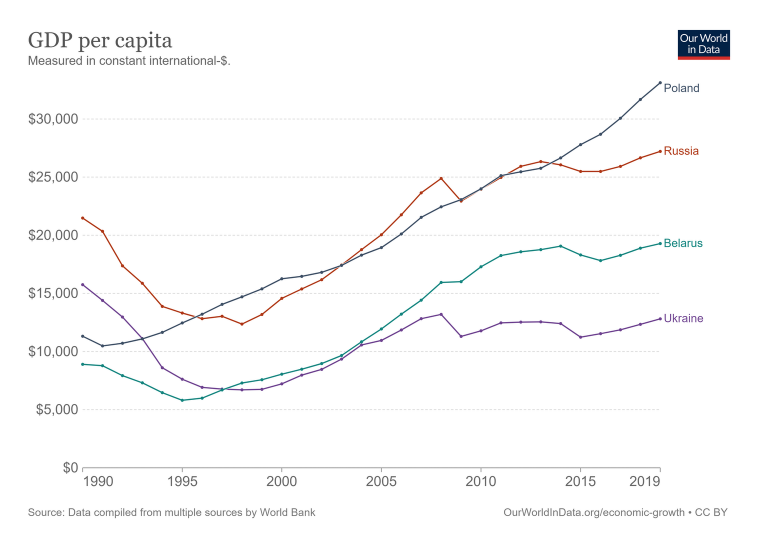Summary:
For a Russian opposed to the war, and helpless to do anything about it, the horror is not that incomes will fall 10% this year, nor that unemployment will double, or that inflation will be 30%. Rather:
in order to get out of this fall – not just to go to growth, but at least to restore it, you need not just make the decision “the war is over” and start negotiations on the gradual lifting of sanctions. We need to repeal dozens if not hundreds of laws passed in the last ten years. I would say – and this is the consensus of economists regarding the Russian economy – that the laws that were adopted before February 24, 2022, the beginning of the war, killed the possibility of growth. (The economy, I remind you, has been stagnant for 11 years. ) And since February 24, there have been very big
Topics:
Chris Blattman considers the following as important:
development,
Economic Growth,
Economics,
elite coalitions,
Russia,
Ukraine
This could be interesting, too:
Lars Pålsson Syll writes Schuldenbremse bye bye
Robert Skidelsky writes Lord Skidelsky to ask His Majesty’s Government what is their policy with regard to the Ukraine war following the new policy of the government of the United States of America.
Lars Pålsson Syll writes What’s wrong with economics — a primer
Lars Pålsson Syll writes Krigskeynesianismens återkomst
For a Russian opposed to the war, and helpless to do anything about it, the horror is not that incomes will fall 10% this year, nor that unemployment will double, or that inflation will be 30%. Rather:
in order to get out of this fall – not just to go to growth, but at least to restore it, you need not just make the decision “the war is over” and start negotiations on the gradual lifting of sanctions. We need to repeal dozens if not hundreds of laws passed in the last ten years. I would say – and this is the consensus of economists regarding the Russian economy – that the laws that were adopted before February 24, 2022, the beginning of the war, killed the possibility of growth. (The economy, I remind you, has been stagnant for 11 years. ) And since February 24, there have been very big changes – in fact, a whole new set of laws and regulations has been adopted. And – as economists can see – there are still a lot of new laws, regulatory institutions, etc. ahead. p. For example, in order to maintain production in closed owner-owned enterprises, nationalization is necessary – even if it is not called that. In order to manage limited currency resources, you actually need a central authority – if it is not so formally called, de facto it will work. I don’t even talk about politics – in recent years and, moreover, in recent weeks, laws and regulations have been passed that destroy any normality of public administration.
And what else does an economist understand. It is very difficult to undo some laws, some court orders, some prohibitions, additional lists and restrictions. It seems only to those who think about reforms as much as lovers of battles – points and fronts. We want, we will reform. But in practice, any reform, even a simple cancellation of the presidential decree, is a complex and long-term task. Every law and every regulation, the most idiotic and temporary, is beneficiaries and those who live better under this regulation. You introduce a tariff – created a powerful lobbyist so that it will never be canceled. Expelled foreigners from some industry – created a powerful lobby to prevent foreigners from being allowed back. Look at the practice: all the prepared regulatory reforms that have been carried out over Putin’s twenty years (mostly in the beginning) are like a drop in comparison to what it takes to bring legislation and practice at least to the level of 2018.
That is my colleague (and Russian economist) Konstantin Sonin on Facebook with sobering thoughts on what many millions face for the rest of their days.
Here, by the way, is Noah Smith on the less gloomy prospects for the post-war Ukrainian economy. It’s true that most war-damaged economies return to their pre-war levels of capital and output remarkably quickly. There is a big “but” there—this all depends on the effect of war on rules, stability, regulation, and other institutions.
Ukraine’s economy stagnated for three decades for good reasons, including (I infer) the lack of any elite political coalition with an interest in economic dynamism and the creative destruction that entails.
Think about it: a middle-income country situated between a heathy and dynamic economy (the EU) and a rebounding superpower with oil wealth. How the hell, by 2022, did the Ukrainian government manage to have a lower income per person than in 1989? This graph is probably one of the most important to understand how Ukraine found itself in a supine position versus Russia:

The most likely explanation, in situations like this, is that the people running the country and enriched by the existing economic order had zero interest whatsoever in economic development. If those people and positions have not changed, then I am not optimistic about Ukrainian growth after the war.
To me, Sonin is telling us the same story about Russia: there is no elite coalition in favor of economic development. Rather, they are focused on maintaining political control and pursuing militaristic agendas. Surely Putin and his cronies would love to find a way to enrich themselves and the country at the same time, if they knew how to do so. The Chinese government has given the world a masterclass in this for several decades. But it’s not clear anyone knows how they pulled it off, let alone how to repeat that trick (including the Chinese).
Related

